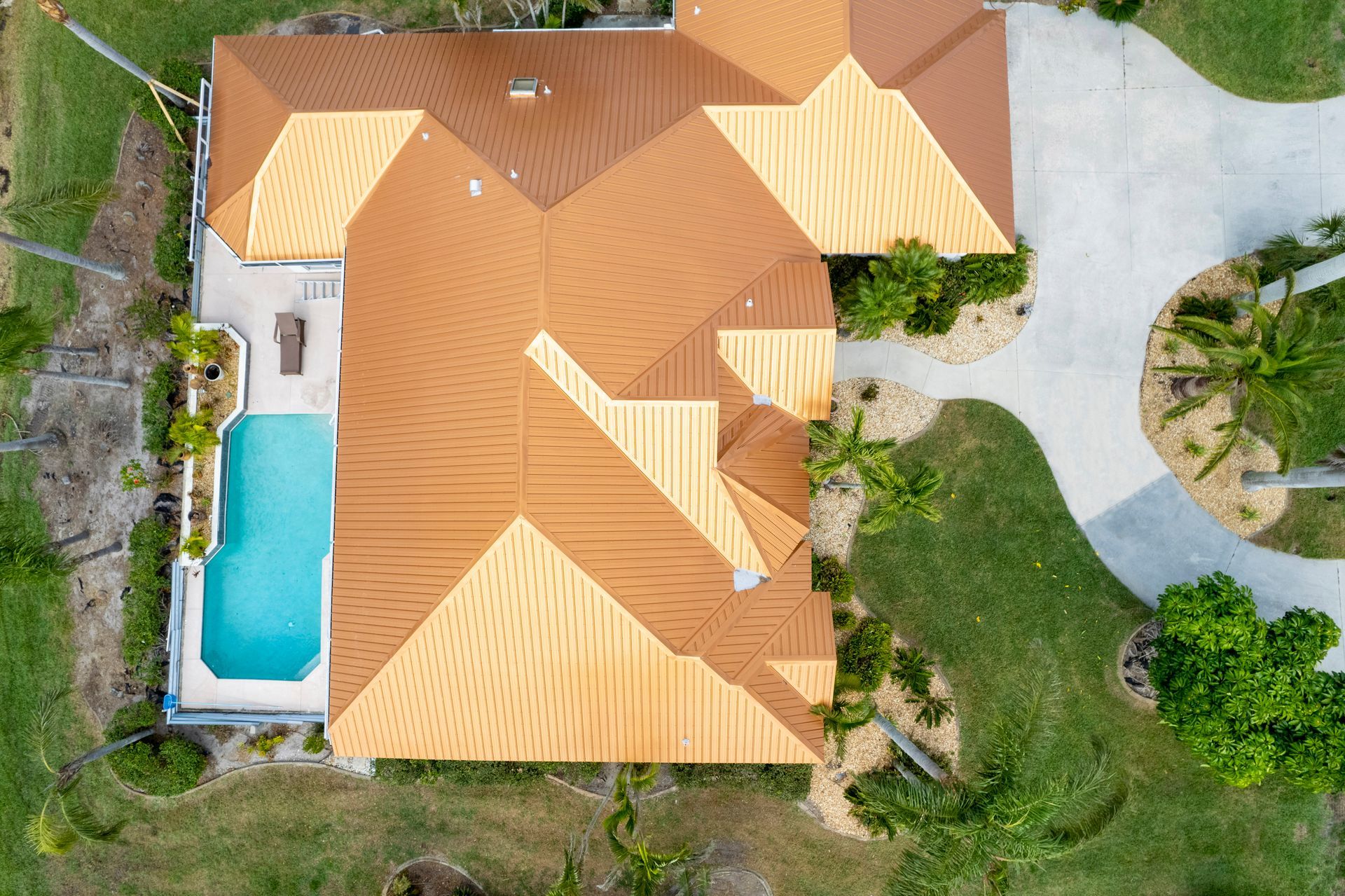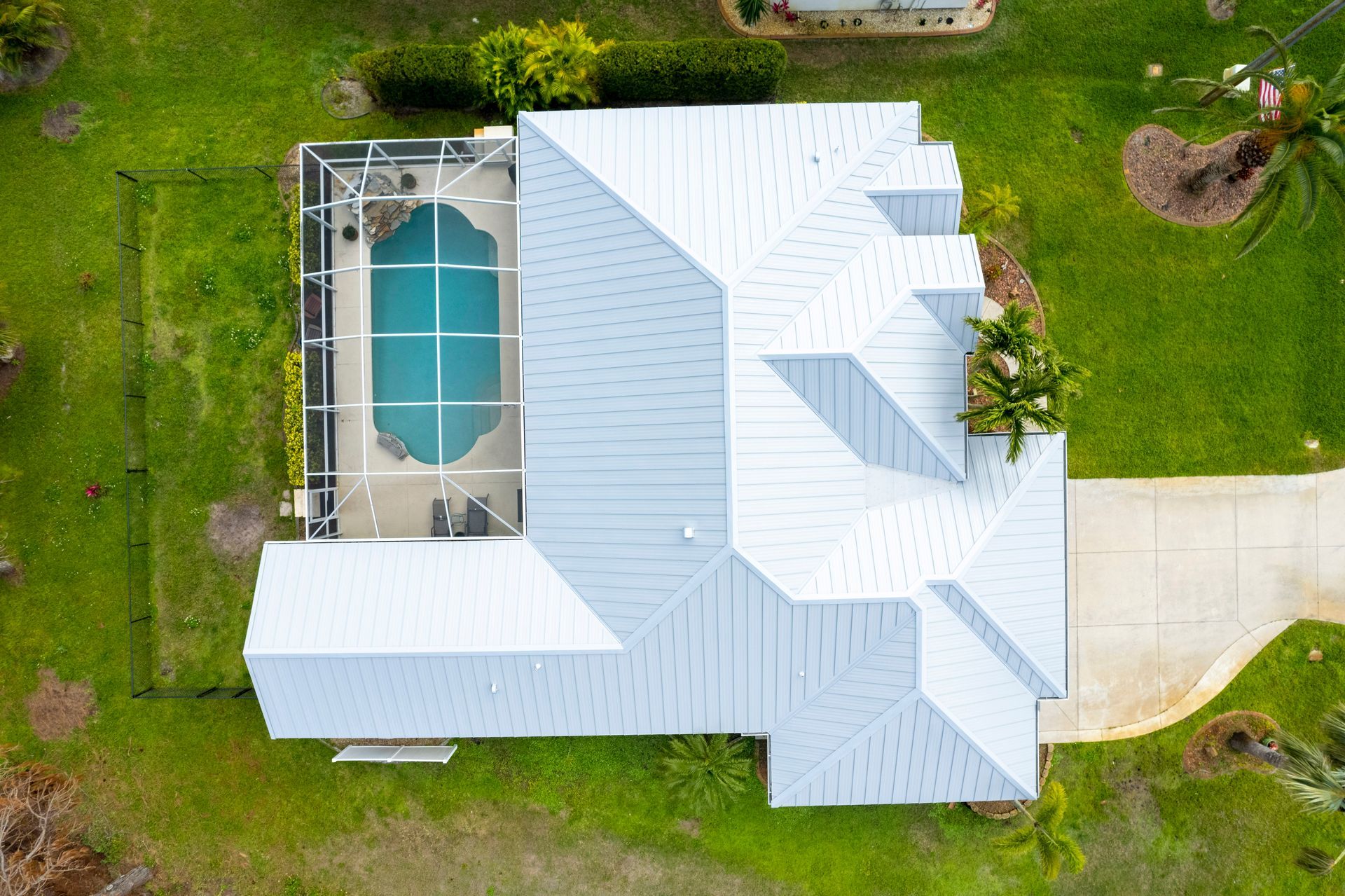Metal vs. Shingle vs. Tile Roofs: Choosing the Best Option for Sarasota’s Climate
Understanding Sarasota’s Climate and Roofing Needs
Sarasota, Florida, is known for its humid subtropical climate, characterized by long, hot summers, high humidity levels, and frequent tropical storms. The region experiences heavy rainfall, especially during hurricane season, and mild but occasionally cool winters. These weather patterns make selecting the right roofing material crucial for homeowners. A roof in Sarasota must withstand not only intense heat and humidity but also potential damage from wind and rain brought on by tropical storms and hurricanes.
The combination of extreme heat, high humidity, and coastal exposure creates unique challenges for roofs in Sarasota. High temperatures can cause materials to degrade faster, while salt air from the Gulf of Mexico accelerates corrosion. Additionally, the risk of mold and mildew growth due to humidity means that a durable, moisture-resistant roof is essential. Homeowners need to consider these factors carefully to ensure their roof performs well and lasts as long as possible.
Overview of Metal, Shingle, and Tile Roofing Materials
Metal roofs are made from materials like aluminum, steel, or copper and are known for their sleek, modern appearance. Asphalt shingles, the most common roofing material , are budget-friendly and come in a variety of colors and styles. Clay or concrete tiles offer a classic Mediterranean look and are often seen in upscale neighborhoods. While metal roofs typically last 40-70 years, asphalt shingles have a shorter lifespan of 15-30 years, and tile roofs can endure for 50 years or more with proper care.
In coastal and subtropical climates like Sarasota's, each material has its appeal. Metal roofs are valued for their durability and resistance to extreme weather. Asphalt shingles remain popular due to their affordability and ease of installation. Meanwhile, tile roofs are favored for their aesthetic charm and longevity, making them a staple in areas where curb appeal matters.
Durability and Lifespan in Sarasota’s Weather
When it comes to handling Sarasota's heat, solar radiation, and severe storms, metal roofs stand out for their exceptional durability. They resist warping and cracking even under intense sun exposure and can endure wind speeds of up to 140 mph or more. Asphalt shingles, while cost-effective, are less resistant to heat and may require replacement sooner in Sarasota's harsh conditions. Tile roofs, though heavy and sturdy, can crack under hail impact or improper installation during storms.
Beyond weather resistance, maintenance is another key consideration. Metal roofs are naturally resistant to mold, mildew, and salt air, requiring minimal upkeep. Asphalt shingles, however, may develop algae stains in humid environments and need periodic cleaning. Tile roofs are also low-maintenance but can be prone to chipping or breaking if walked on, which increases repair costs over time.
Energy Efficiency and Cooling Performance
Energy efficiency is a critical factor for Sarasota homeowners looking to reduce cooling costs during sweltering summers. Metal roofs excel in this area because they reflect sunlight rather than absorbing it, keeping homes cooler. Asphalt shingles tend to absorb more heat, raising indoor temperatures unless paired with reflective coatings. Tile roofs offer moderate energy efficiency, as their thickness provides some insulation against heat transfer.
To enhance cooling performance, homeowners can choose "cool roof" options, such as light-colored metal panels or specially coated shingles designed to reflect solar rays. Proper insulation beneath any roofing material further improves energy savings. For those seeking eco-friendly solutions, metal roofs are often compatible with solar panel installations, adding another layer of sustainability to your home.
Hurricane, Wind, and Impact Resistance
Hurricane resistance is a top priority for Sarasota roofs , given the region's vulnerability to tropical storms. Metal roofs lead the pack with impressive wind ratings, often certified to withstand winds exceeding 140 mph. Asphalt shingles vary widely in quality; some premium versions meet hurricane-zone standards, but cheaper options may fail under strong gusts. Tile roofs, while heavy and stable, can break if struck by flying debris during a storm.
Installation techniques play a significant role in enhancing wind resistance. For example, using hurricane straps or clips can secure metal and shingle roofs more effectively. Over time, repeated exposure to tropical storms may wear down asphalt shingles faster than other materials. In contrast, metal and tile roofs maintain better structural integrity, provided they're properly installed and maintained.
Maintenance, Repairs, and Longevity
Metal roofs require little maintenance beyond occasional inspections for loose fasteners or minor scratches. Asphalt shingles demand more attention, particularly in Sarasota's humid climate, where algae growth can discolor the surface. Homeowners may need to clean or apply preventative treatments every few years. Tile roofs are relatively low-maintenance but can incur higher repair costs if individual tiles crack or shift out of place.
Over the years, repair needs will vary depending on the material. Metal roofs rarely need major fixes, while shingle roofs might require patching or full replacements after a decade or two. Tiles, though durable, can be costly to repair due to their weight and fragility. Homeowners should weigh these factors when planning for long-term upkeep and budgeting accordingly.
Cost Comparison: Installation and Long-Term Value
Initial installation costs differ significantly among roofing materials. Asphalt shingles are the most affordable, typically ranging from $3 to $5 per square foot, including labor. Metal roofs cost more upfront , averaging $7 to $12 per square foot, but their longevity offsets the investment. Tile roofs are the priciest option , costing $10 to $15 per square foot, largely due to their weight and specialized installation requirements.
While asphalt shingles are economical initially, their shorter lifespan means higher long-term costs. Metal and tile roofs offer better value over time through reduced maintenance, energy savings, and increased property value. When considering overall expenses, homeowners should evaluate how each material aligns with their budget and goals for sustainability and resale value.
Home Aesthetics and HOA Considerations
Roofing materials greatly influence a home's visual appeal and neighborhood harmony. Metal roofs provide a sleek, contemporary look, available in various colors to complement modern designs. Asphalt shingles offer versatility, mimicking wood, slate, or tile finishes at a fraction of the cost. Tile roofs exude elegance and are ideal for Mediterranean, Spanish, or ranch-style homes prevalent in Sarasota.
Local homeowners' associations (HOAs) often regulate roofing choices to maintain uniformity within neighborhoods. Some HOAs restrict metal roofs due to their industrial appearance, while others mandate tile for historical or aesthetic consistency. Before making a decision, homeowners should review their HOA guidelines to ensure compliance and avoid potential disputes.
Sustainability and Environmental Impact
Metal roofs are the most environmentally friendly option, as they are fully recyclable and reduce urban heat island effects through reflective coatings. Asphalt shingles contribute to landfill waste due to their shorter lifespan and limited recyclability. Tile roofs, though heavy, are made from natural materials like clay and concrete, offering a lower carbon footprint compared to synthetic alternatives.
Insurance, Building Codes, and Local Incentives
Sarasota building codes emphasize wind resistance and fire safety, favoring materials like metal and tile that meet strict hurricane-zone standards. Homeowners who install impact-resistant roofs may qualify for reduced insurance premiums, as these materials minimize storm-related risks. Metal roofs, in particular, are often eligible for discounts due to their superior durability.
Florida offers incentives for energy-efficient upgrades, including rebates for cool roofs and solar-compatible systems. Homeowners should explore local programs to offset installation costs and maximize savings. By choosing a roof that complies with codes and qualifies for incentives, residents can enjoy both financial benefits and peace of mind.
Professional Installation and Contractor Selection
Selecting a licensed, insured, and experienced contractor is vital for ensuring proper installation and maximizing your roof's lifespan. Look for certifications from organizations like the National Roofing Contractors Association (NRCA) or manufacturers’ warranties that guarantee workmanship. A reputable contractor will assess your home's specific needs, recommend suitable materials, and adhere to all local codes and regulations.
Common Mistakes When Choosing a Roof in Sarasota
A common mistake is prioritizing upfront costs over long-term value, leading to frequent repairs or premature replacements. Ignoring Sarasota's unique climate conditions, such as humidity and hurricane risks, can result in poor material choices. Additionally, overlooking maintenance requirements may leave homeowners unprepared for future expenses. To avoid these pitfalls, thorough research and consultation with experts are essential.
FAQ: Sarasota Roofs – Metal, Shingle, or Tile?
Which roofing material lasts longest in Sarasota?
Metal and tile roofs generally outlast asphalt shingles in Sarasota's challenging climate. With proper care, metal roofs can last 40-70 years, while tile roofs endure for 50 years or more. Asphalt shingles typically last 15-30 years, making them less durable in the face of Sarasota's heat, humidity, and storms.
Are metal roofs noisier during rainstorms?
Modern metal roofs are designed to minimize noise, thanks to solid sheathing and insulation layers beneath the panels. Compared to tile or shingle roofs, metal produces only slightly more sound during rainstorms, which is usually negligible indoors.
What is the best roof for hurricane protection?
Metal roofs are widely regarded as the best choice for hurricane-prone areas like Sarasota. Their high wind-uplift ratings and resistance to debris make them a reliable option for safeguarding homes during severe storms.
Will a new roof improve my Sarasota home’s resale value?
A new roof can significantly boost your home's resale value, especially if it features durable, energy-efficient materials like metal or tile. Buyers appreciate roofs that promise longevity and reduced utility bills, giving you an edge in Sarasota's competitive housing market.
How do Sarasota’s humidity and salt air affect roof materials?
Humidity and salt air accelerate corrosion in metal roofs unless they're specifically treated for coastal use. Asphalt shingles may develop algae stains, while tile roofs remain largely unaffected, though salt deposits can dull their finish over time.
Conclusion: Making the Right Roofing Choice for Sarasota’s Climate
Choosing the right roof for Sarasota involves balancing several factors, including climate suitability, durability, maintenance needs, and aesthetic preferences. Metal roofs shine in terms of longevity and storm resilience, while tile roofs offer timeless beauty and stability. Asphalt shingles provide affordability but come with trade-offs in lifespan and performance. Ultimately, the best choice depends on your budget, style preferences, and long-term goals for your home.
Consulting with local licensed roofing professionals is highly recommended to ensure you make an informed decision tailored to your home's unique needs. By investing in the right roof now, you can enjoy decades of comfort, energy savings, and protection in Sarasota's dynamic climate. Remember, a well-chosen roof isn't just a shelter—it's a smart investment in your home's future.
If you're ready to explore your options, reach out to trusted roofing experts today for personalized advice and competitive quotes. Your dream roof could be closer than you think!
Have any questionS?
Reach out to our roofing specialists for more answers on the various options for your home.



